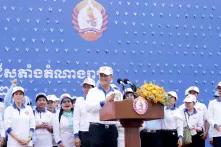This dossier provides a diverse selection of strong civil society voices from Cambodia. We hope that the analyses and contributions included will lead to a better understanding of the results, impacts and successes of the actions of Cambodian civil society.

Cambodia is facing various social, economic, and human development challenges. From climate change to endemic levels of gendered violence, there is no shortage of obstacles confronting the country and standing in the way of prosperity for its citizens. Reportedly adding to the catalogue of challenges, the country has experienced a steady decline in the respect for human rights, fundamental freedoms, freedom of speech, as well as the scope for independent and uncensored media. All of these are crucial factors for a flourishing democratic environment, as mandated by the country’s constitution.
However – and despite a tightening of the space for civic participation in recent years – non-governmental organizations (NGOs) in the country continue to play a fundamental role in shaping a culture of democratic governance and participation. Civil society (CS) in Cambodia remains a crucial element for public dialogue and awareness on issues and ideas of public interest, bridging the space between the state and its citizens. Furthermore, CS establishes an environment for learning, human rights awareness, and the promotion of citizenship. The civic information and education outcomes provided by these civil society organizations (CSOs) are not only vital for civic participation, they also strengthen its development. The impact of CSOs as development stakeholders is undeniable and deserves recognition.
This dossier attempts to do exactly that, by providing a look at the civil society space, related interventions, and the innovative methods of NGOs. They are at the forefront of awareness-raising, advocacy, and educational campaigns about some of the country’s unsustainable developmental choices and their impact on the basic rights of Cambodians. In portraying examples of civil society engagement, the dossier – without disregard for the ongoing crackdown on civil society activism – aims to honor and give visibility to the efforts of civil society actors and organizations. It illustrates how Cambodian visual artists creatively explore and express complex urban, social, and environmental concerns. Poetry is used as an important form of expression and it showcases young people’ everyday struggles and social issues while providing them with a voice, despite the increasingly shrinking space for expression. Moreover, with regard to the promotion of gender equality, brave women are leading projects to end violence and the abuses perpetrated because of gender. Women’s rights and feminist organizations relentlessly provide essential advocacy, networking, and community outreach. Their work has contributed to an increase in the public recognition of women and strengthened their active involvement in social development.
All of this is taking place despite an atmosphere of intimidation and fear. CSOs have various creative methods, can raise their voices, and will continue to have an impact across the country, as argued by one of the contributors. In his words: “The hurdles that CSOs face should therefore be used as a chance to improve and adapt resilient strategies in the fight for the rights of marginalized people and the protection of livelihoods and the environment.”
We hope that this dossier contributes to a better understanding of the opportunities being presented by the strong voices in civil society that are improving Cambodian society.
hbs Asia division


